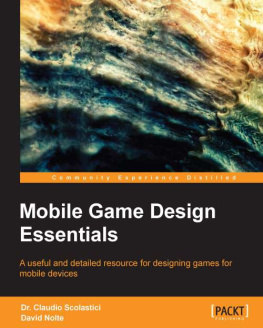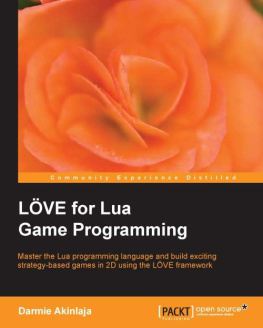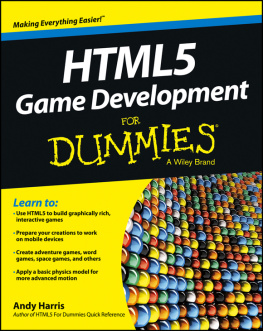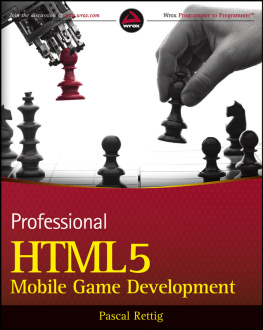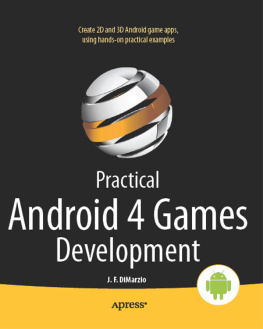Francisco Tufró - Developing Mobile Games with Moai SDK
Here you can read online Francisco Tufró - Developing Mobile Games with Moai SDK full text of the book (entire story) in english for free. Download pdf and epub, get meaning, cover and reviews about this ebook. year: 2013, publisher: Packt Publishing, genre: Home and family. Description of the work, (preface) as well as reviews are available. Best literature library LitArk.com created for fans of good reading and offers a wide selection of genres:
Romance novel
Science fiction
Adventure
Detective
Science
History
Home and family
Prose
Art
Politics
Computer
Non-fiction
Religion
Business
Children
Humor
Choose a favorite category and find really read worthwhile books. Enjoy immersion in the world of imagination, feel the emotions of the characters or learn something new for yourself, make an fascinating discovery.
- Book:Developing Mobile Games with Moai SDK
- Author:
- Publisher:Packt Publishing
- Genre:
- Year:2013
- Rating:4 / 5
- Favourites:Add to favourites
- Your mark:
Developing Mobile Games with Moai SDK: summary, description and annotation
We offer to read an annotation, description, summary or preface (depends on what the author of the book "Developing Mobile Games with Moai SDK" wrote himself). If you haven't found the necessary information about the book — write in the comments, we will try to find it.
Learn the basics of Moai SDK through developing games
Overview
- Develop games for multiple platforms with a single code base
- Understand the basics of Moai SDK
- Build two prototype games including one with physics
- Deploy your game to iPhone
In Detail
Moai SDK is a fast, minimalist, open-source Lua mobile framework for pro game developers. Moai is built around Lua, a common programming language for games, and offers a single open-source platform for both the front-end elements seen by consumers and the back-end infrastructure.
Developing Mobile Games with Moai SDK will guide you through the creation of two game prototypes in a step-by-step way, giving you the basic tools you need in order to create your own games.
Developing Mobile Games with Moai SDK introduces the basic concepts behind game development, and takes you through the development of a tile-based memotest, and a platform game prototype as well. Youll end up with a good codebase to start writing your own games.
You will learn some tricks that come from real life experience while creating a small framework that will allow you to display images, play sounds, grab input, and so on. Youll also learn how to implement physics using Box2D bindings, and everything in Lua, without having to use any compilations. After doing this, well take a look at how to deploy your game to iOS and run it on an iPhone.
With this book, you should be ready to go and create your own game, release it to the Apple Store, and have enough tools to dig deeper into Moai SDK.
What you will learn from this book
- Display images and play sounds
- Iterate on gameplay implementation using Lua
- Group your code in modules to make it maintainable
- Work with Grids to manage rendering and gameplay
- Build a game with physics
- Animate a character and make it move with the keyboard
- Work with the camera and create some nice parallax effects
- Save memory and loading time using caching
- Deploy your game to iPhone and iPad
Approach
A normal step-by-step tutorial with two sample games built in, to teach Moai SDK from scratch.
Who this book is written for
This book is for anyone who wants to build games, especially if they want to quickly iterate using a scripting language like Lua, and theyre targeting more than one platform. All of this without having to spend your salary on licenses. Moai SDK is aimed to professionals, but it has a great community that will help you learn and be a part of it.
Francisco Tufró: author's other books
Who wrote Developing Mobile Games with Moai SDK? Find out the surname, the name of the author of the book and a list of all author's works by series.

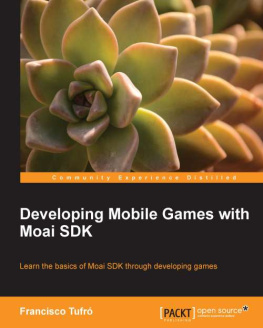
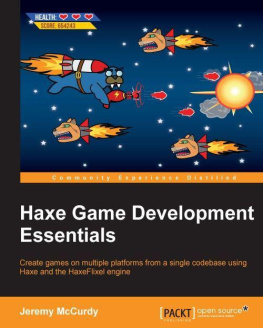
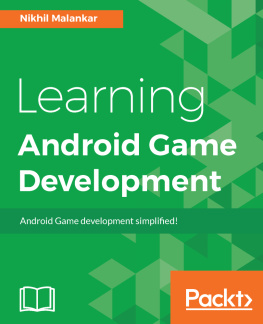
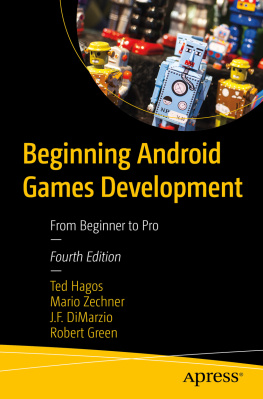
![Jayant Varma [Jayant Varma] - Learn Lua for iOS Game Development](/uploads/posts/book/124117/thumbs/jayant-varma-jayant-varma-learn-lua-for-ios.jpg)
![Damilare Darmie Akinlaja [Damilare Darmie Akinlaja] - LOVE for Lua Game Programming](/uploads/posts/book/124110/thumbs/damilare-darmie-akinlaja-damilare-darmie.jpg)
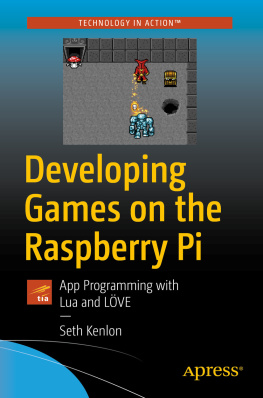
![Emanuele Feronato [Emanuele Feronato] - Flash Game Development by Example](/uploads/posts/book/120345/thumbs/emanuele-feronato-emanuele-feronato-flash-game.jpg)
